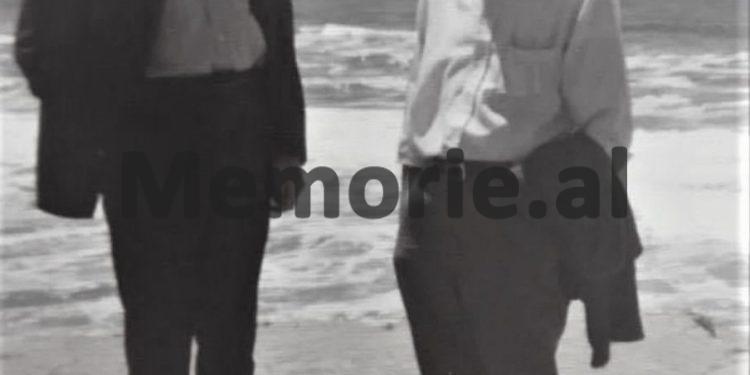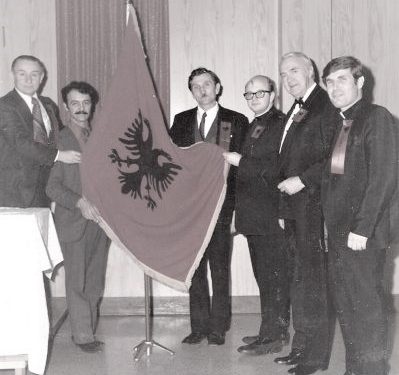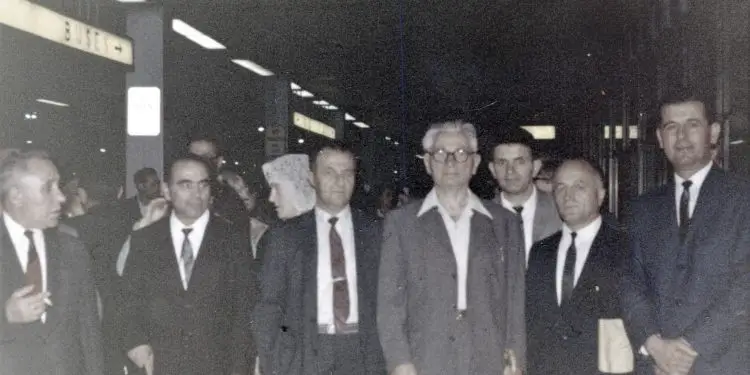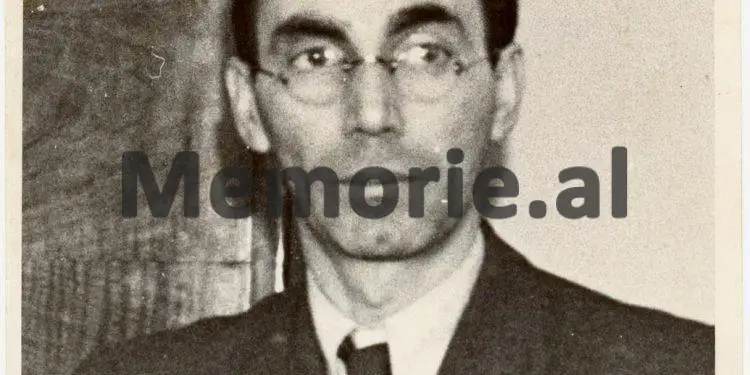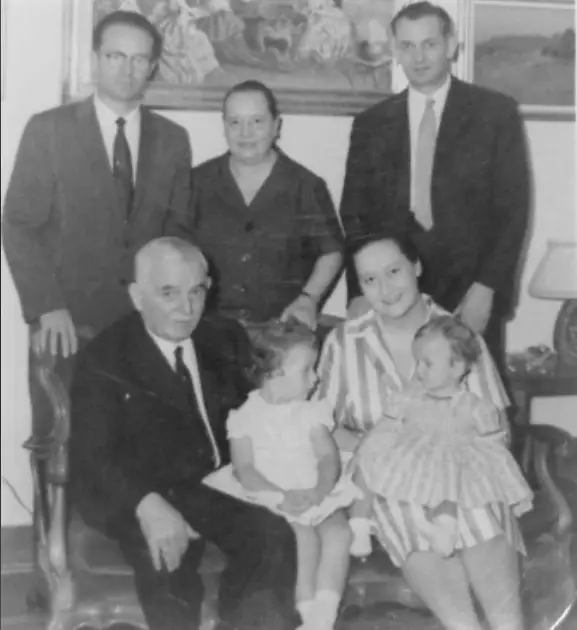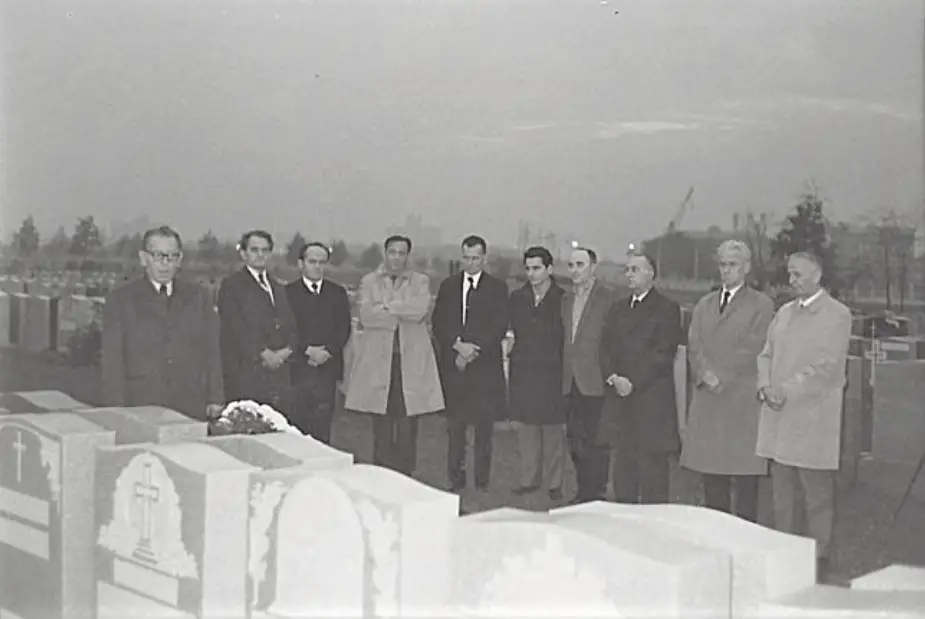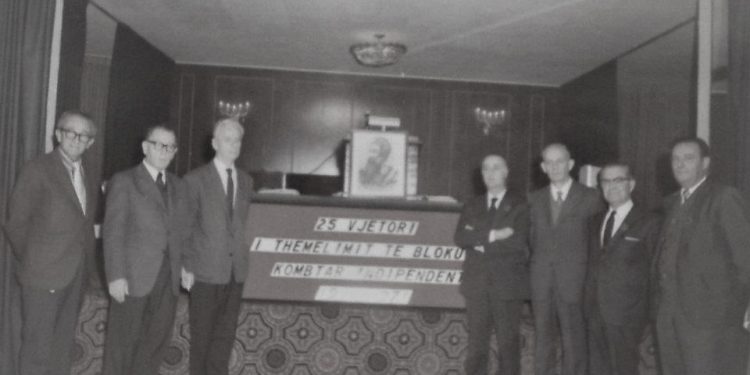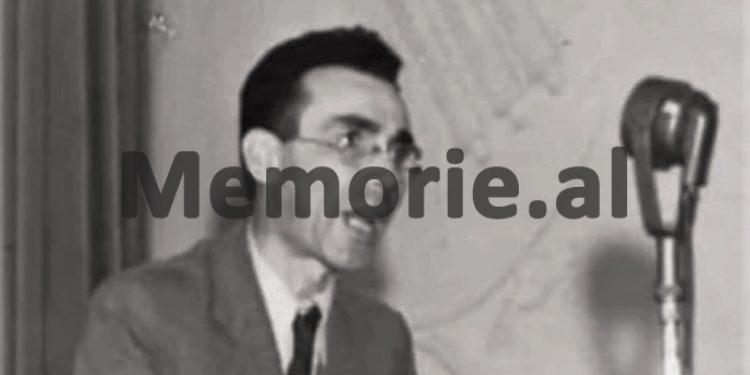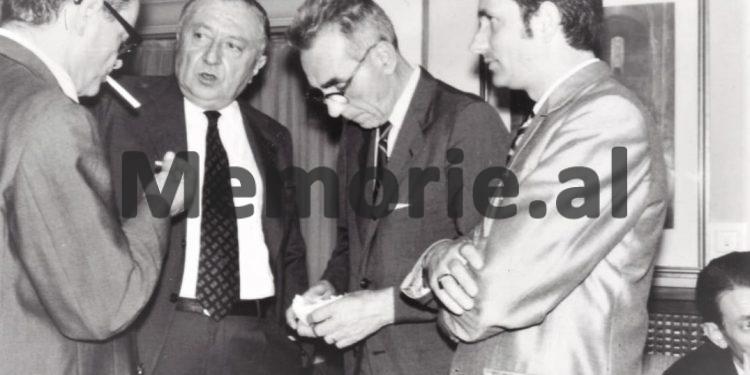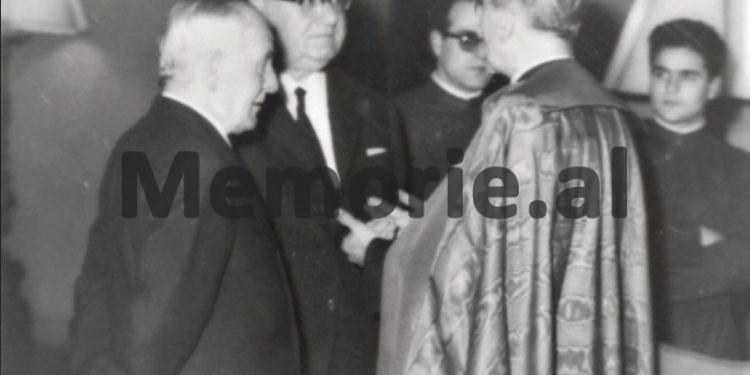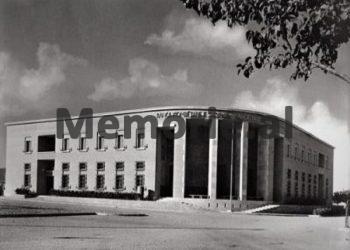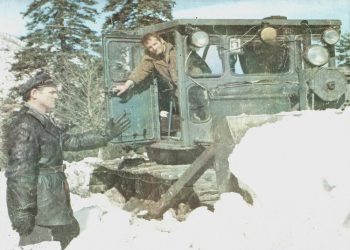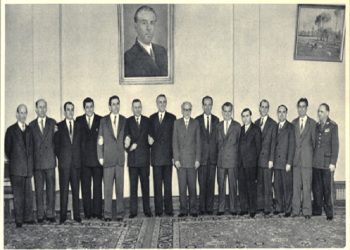By Idriz Lamaj
The fifth part
From the works of the apostles of ethnic Albania
Xhafer Deva
In light of his own letters and other diaspora revelations
Preface
Memorie.al/ Probably like many others, I often browse letters with my friends and associates, who are no longer in this life. Browsing through them, for a moment unfolds memories that it seems to me that some of them can serve our history. Then, I return to the awareness of the current difficult situation in the ethnic homeland, caused by the quadruple of Albanian politics, I say to myself: “What can my memories of others or the letters of the people of dead? ”
Without being the ominous instigator of pessimism, thinking as always of a better future, I return to my obligations to my friends, and as an icy observer of time, without any claim of historical service, when I am given the opportunity of publication, write what I have in mind, always based on their writings and letters. This principle is also followed in this book about Xhafer Deva. I knew Xhafer Deva in person; we exchanged visits and had a strong correspondence.
I spent days off at his house and inherited all of Xhafer Deva’s correspondence with Rexhep Krasniqi, his closest friend, for more than 40 years. After many years, I talked on the phone with Mrs. Deva’s daughter and son-in-law. In the conversation going on, taking advantage of the old friendship, I asked about his letters and they informed me that it was all Qefali Hamdia, a friend of their family.
In June of last year (2001) I went to Kenosha, Wisconsin, a guest of Qefali Hamdia, to look at Xhafer Deva’s correspondence, which Mrs. Deva sent her years ago, when she, due to her advanced age, was closed his house to go to the house of his 5th daughter and son-in-law, Mrs. Burgl Dagmar and Rev. Dennis Logie.
After reading the bulk of the letters, in the languages I knew, I took with me more than a thousand pages of his correspondence, covering a period of over 30 years, 1945 – 1978. Xhafer Deva spoke and wrote seven – eight languages. His correspondence is: Albanian, English, German, Italian, French, Turkish and Serbian. Xhafer Deva’s letters and writings, with the exception of those in Old Turkish and Serbian in Cyrillic, are mostly typewritten, well-kept, and alphabetically arranged, with the persons he dealt with.
That includes his family letters. He carefully kept a copy of every letter he sent and every letter he received. Mrs. Oswalda Deva, daughter Burgl, son-in-law Dennis Logie and Mr. Qefali Hamdia with family, expressed his heartfelt thanks for the trust they gave me. With special gratitude I recall here the help given to me by my brothers – Captain Nue Gjomarkaj and Nikoll Gjomarkaj, in the preparation of one of the most important chapters of this book.
Kapidan Nou, in addition to making available the subject on Xhafer Deva’s relations with the ‘Independent National Bloc’ and sending paratroopers to Albania and Kosovo, reviewed with me each document of that period, and we formulated the text in the form of a conversation; while Nicholas, deciphered the letters, transcribed and translated from Italian, the unpublished materials to date, which were published in this chapter.
Continues from the last number
Xhafer Deva’s life and activity in exile
– Kosovo in the time of ethnic Albania –
Xhafer Deva in the light of his own letters
Xhafer Deva’s relations with the ‘Independent National Bloc’ and their parachute missions in Albania and Kosovo
To have a clear picture of Xhafer Deva’s relations with the ‘Independent National Bloc’, let us first see what this Albanian political party in exile was and how it concretized its political and military activity for the liberation of Albania from the communist regime. .
The ‘Independent National Bloc’, created on November 6, 1946, was an Albanian nationalist political party, which from the very beginning had as its main goal the organized struggle against Slavo-Bolshevik communism, as it is described in every document that was imposed on the Albanian people.
The founders of the ‘Bloc’ came from different political backgrounds and environments, but they all had in common the pain for the families that were killed, imprisoned and exiled and the deep concern for the fate of the nation and the homeland, whose existence as a free state was threatened and independent.
The Albanian communist regime, since taking power, turned Albania into a full-fledged colony of Yugoslavia and later Russia.
The action program of the ‘Independent National Bloc’ was defined by the principled provisions of the Statute, in the spirit of feelings for Albanian brotherhood and cooperation, aiming at the ideal of a free, independent, ethnic, democratic and anti-totalitarian Albania.
The ‘Bloc’ carried out its activity in two directions: the fight against the communist regime, both in words and writings, as well as with organizations of fighters inside Albania.
Analysts of the time, based on various historical documents, thought that Albania could be liberated from the communist regime in the 1950s, when it was not yet a member of the ‘Warsaw Pact’ and when the Cold War was reaching its peak due to forced expansion to international communism, both with the coming to power of the communist regime in China in 1948, and with the outbreak of the bloody Korean War.
The weakened political situation of the communist regime in Tirana, gave courage to the ‘Bloc’ to organize groups of freedom wars inside Albania, by sending parachute missions in the northern areas of the country, namely in Mirdita.
Although the ‘Bloc’ was for rapprochement with other diaspora political forces for harmonized action cooperation for the benefit of the national cause, unfortunately it did not find proper support from some other parties, which also carried out their activity.
By not evaluating the activity of this party at the proper level, the diaspora had bitter consequences, and remains divided and divided.
The ‘Bloc’, as an undeniable force of the center, from the very beginning managed to gather around itself Albanian emigrants and moderate political groups with which it developed a concrete cooperation.
His sincere coalition with the ‘Second League of Prizren’ in Exile (the Kosovar group led by Mr. Xhafer Deva), the Alexandria Protocol in Egypt in 1948, in the Covenant with the ‘National Front’ (Ali Këlcyra’s group) and more lately with the Democratic Union, it unquestionably strengthened its operating mission.
In this political context, the ‘Bloc’ continued with dignity its right path. With various congresses in Italy, New York and Belgium, the ‘Bloc’ proved with facts to be alive, was capable and very careful with foreigners and never passed the framework of mutual trust in its activity, until how it ceased to operate in the early 1990s.
“With the changes that began in the socialist states, it was seen that the movement for freedom and democracy was inevitable in Albania as well. December 1989 in New York and decided to take the initiative to support the democratic opposition in Albania, to call on the people to vote for democracy and, with votes, to overthrow communism.
The “bloc” did not seek to take an active part in the electoral process, because it did not want to harm the democratic opposition. He only demanded that all non-communist votes go in favor of democracy.
Activity as a political party in exile is no longer meaningful. But one thing is reasonable and necessary: ‘Independent National Bloc’ with its program and activity of more than 45 years in the service of the nation, should be made known to the Albanian people.
This is required by the sacrifices of the ‘Bloc’ and its national ideal is confirmed today by one of the founders of the ‘Bloc’, the Captain of Mirdita, Nue Gjomarkaj, with whom we worked closely in the preparation of this chapter, which is related to Xhafer Deva and Kosovo.
Before entering the fixed topic, on the cooperation of Xhafer Deva with the ‘Bloc’ in the field of sending parachute missions, we will say something about how the ‘Block’ was created and from whom did the idea of its creation come?
Immediately after the Second World War, in 1945, Albanian emigrants had begun to gather in Italy, the only country that provided a guarantee of salvation. With this firm belief, the Captain of Mirdita, Gjon Marka Gjoni, together with his son, Nue Gjomarku, who had left Albania on November 28, 1944, after many vicissitudes, passing through different countries, through war zones and under bombardment of terrible, in April 1945, arrived in Italy (Merano). In August of that year they went to Rome, where they settled forever.
At that time, Italy was occupied by the allies, but the Italian Communist Party was strong, and that situation caused great fear among the Albanian emigrants for their surrender to the Albanian communist government. This fear was reinforced by the capture and internment in Ventotene of Mit’hat Frashëri and Ali Kelcyra, ready for surrender. The provisional Italian government, though weak at the time, showed an understanding and sympathy for the Albanians, providing them with good treatment and protection. Thus the Albanians calmed down somewhat and began to make contact with each other.
In September 1945, Gjon Marka Gjoni accidentally meets his friend, prof. Ernest Koliqin. The joy was great, not only that two close friends met, but also two strong pillars: that of traditionalism (Gjon Marka Gjoni) and that of national culture (prof. Ernest Koliqi).
With daily meetings and slow assemblies they examined the miserable situation created in Albania as well as the situation of the diaspora, which had remained disoriented. On the other hand, he was disturbed by the denigrating propaganda of various Albanian parties, which had begun to harass the honor of the majority of Independents, to the point of causing political and social outrage and forcing them to oppose any of their claims.
In consideration of that political and social situation quite complicated and unsuitable for a union of political forces, as after Mr. Gjomarkaj, the persons in question study the way to find a way out of that chaos created:
“After many talks and consideration of the problem, prof. Koliqi presented the idea of joining a political organization to emerge as a third political force, with certain points. The captain of Mirdita, replied that he belonged to the ‘National Independent Group’, created by Mark Gjomark in Shkodra, in March 1944. Prof. Koliqi remained somewhat dumbfounded, but to remember the importance of that national work of Mark Gjomark, after a few days, said to Captain John: I had a close friendship with Mark and we were collaborators, so I do not think with deviated from his path but, in the state in which we find ourselves here in exile, it seems to me reasonable to extend the circle. For this reason, I propose to you: to turn the ‘National Independent Group’ into the ‘Independent National Bloc’. This suggestion of the professor seemed reasonable to us so we accepted it.
To realize this idea, we got in touch with kind friends who were seduced and pretended to be willing to talk in a general meeting. On November 6, 1946, after many talks, the creation of the ‘Independent National Bloc’ was concretized, which was announced with this ‘Verbal Process’.
Process – verbal
(Held today with 6 Nanduer 1946)
The following, representatives of various independent groups in Rome, gathered for a review of the situation and the most pressing aspects of immigration, after discussing in detail all the issues raised in the conversation and after addressing their gratitude to the Government. Democratic Italy for hospitality in its generous land; Remember that the international situation itself suggests a closer and more active approach to all those Albanians who emigrated, who are inspired by the most sacred feelings of patriotism, many of whom have dedicated their lives to the Albanian cause and since her do not want to give up; to have the deepest conviction that the eyes of our Albanians, so enslaved in the homeland, are directed towards the activity of emigration, to remember correctly that without a close union of all these forces of emigration, it is not possible with bring any benefit to the deplorable situation of the homeland; with full conviction that they are committing a patriotic act as at any time, especially sod that our country was abandoned and abandoned by the whole world;
HAVE DECIDED
- To be formed as the Bloc of Independent Groups was formed, this henceforth takes the name ‘Independent National Bloc’.
- To have in principle the cordial cooperation with all those Albanians or groups of Albanians who aim to fight with any appropriate legal means, for the salvation of the homeland from slavery, from terror and from the extermination of the race, which is being threatened day by day, and that they must ensure to the people the sovereignty and integrity toxuer tansuer, as well as all democratic freedoms and especially those of the expression of the vote for the determination of the constitutional form of the state.
I use every way to keep the emigration efficient, to act through the press and with any other means of propaganda for the enlightenment of the world thought, especially of the Albanian colonies abroad.
- This decision takes the form of a premium after obtaining the consent of the independent groups of Reggio Emilia and binding it.
- The signatories of this protocol – commit and will not carry out any individual political activity outside the ‘Bloc’ until they return to Albania.
Rome, 6 Nanduer 1946
- John Mark John
- Ndue Gjomarkaj
- Qazim Mulleti
- Xhemil Dino
- Nebil Dino
- Sotir Kozmo
- Asllan Libohova
- Pandeli Papalilo
- Luigj Gjergjola
- Safa Vlora
- Jak Koçi
- Eduard Liço
- Ismail Vërlaci
- Ernest Koliqi
- Nexhmedin Vrioni
- Xhelal Mitrovica
- Namik Resuli
- Don Frano Karma
- Jorgji Ruçi
- Kapllan Libohova
- Theofan Qesari
- Kadri Myftiu
- Lin Shkreli
- Stefan Gazulli
From the meeting, a three-member commission was appointed to liaise with the migrants of Reggio Emilia’s camp, to inform them about the creation of the ‘Independent National Bloc’, and they were: Nue Gjomarku for those of the North, Xhelal Mitrovica for the Kosovar group, Kadri Myftiu for those in the center.
After a detailed study of the situation, the founders of the ‘Bloc’ published the Basic Statute: The text of the statute ‘Independent National Bloc’, summarizes in its genus honest compatriots who, nurtured by the purest feelings of the Albanian brotherhood, aim for the ideal of a free, independent, democratic and anti-totalitarian Albania.
The ‘Independent National Bloc’, after the great historical events, through which our country was traversed in the last half of the century, wishes the nation an associated political breeding, which, based on its most sound traditions, encompass all the advances of the modern western world.
In order to achieve the goal, during its stay in exile, the ‘Independent National Bloc’ inspires its activity from the following programmatic points:
- Keeping in mind the preservation and protection of rights together with independence, state sovereignty and territorial integrity and the struggle with peaceful means for ethnic Albania, to fight with all its might communism of any kind.
- The pursuit of the cult of traditional values that characterize the Albanian nation, we consider to include in those cults the respect of human personality, family institution, social and political freedoms, free initiative in any field of national activity, always within the region of general utility. Memorie.al
The next issue follows




